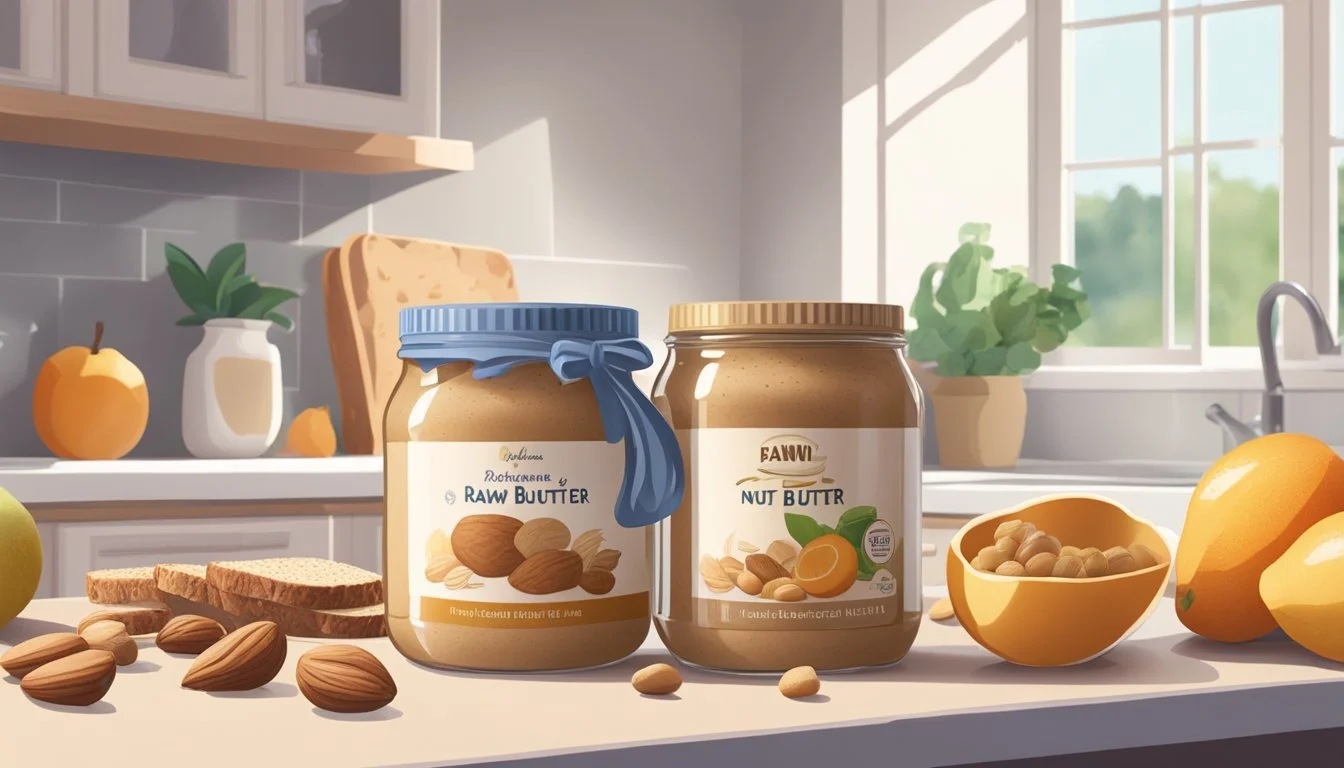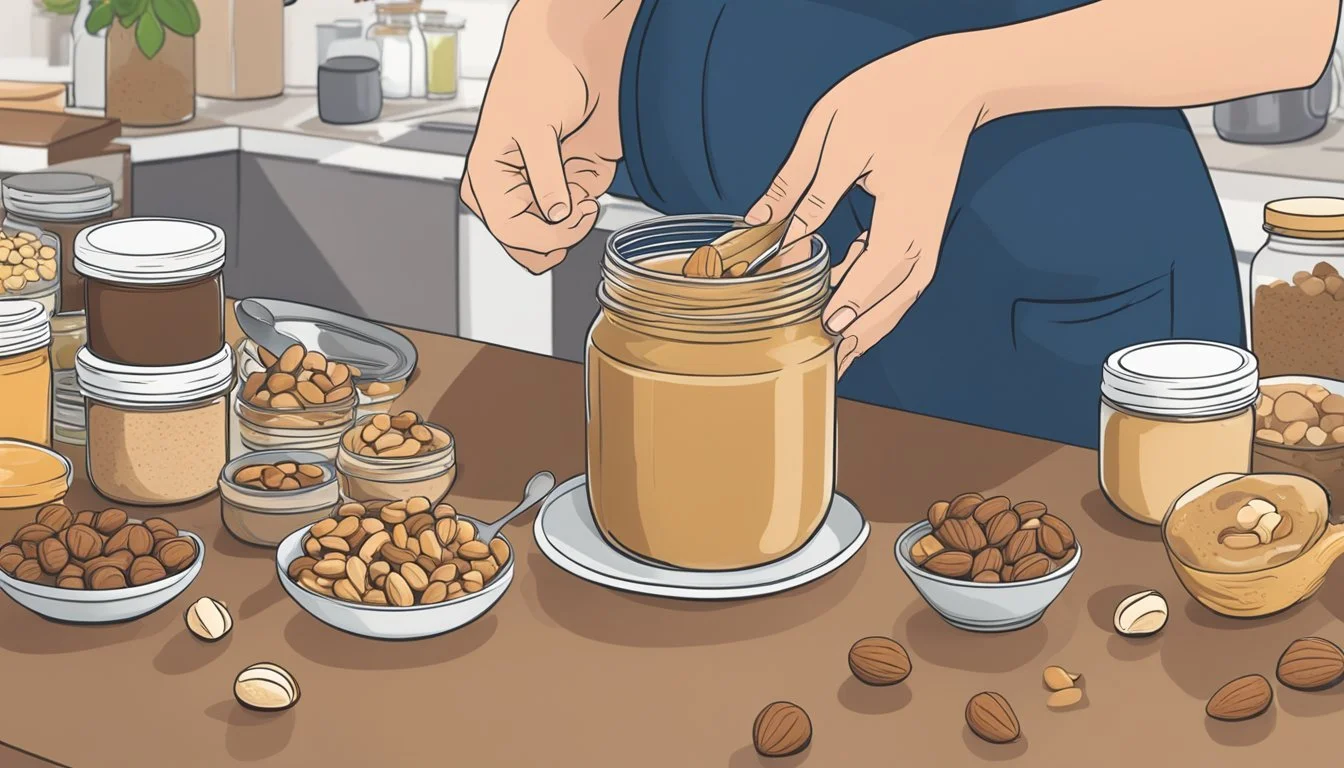Can I Eat Raw Nut Butters During Pregnancy?
Unpacking the Facts
Eating a healthy diet is vital during pregnancy, providing essential nutrients to support both the mother and the growing baby. Nut butters, such as peanut, almond, and cashew, are often considered a nutritious choice due to their high content of protein, healthy fats, and various vitamins and minerals. These spreads can serve as a convenient and satisfying way to fulfill increased nutritional needs during pregnancy.
When it comes to consuming raw nut butters, the key consideration is their safety and how they are processed. Raw nut butters are made from nuts that have not been roasted. While they retain most of the nut's original nutrients, the main concern is the potential for contamination with harmful bacteria, such as Salmonella, which can pose a risk to pregnant women. It is crucial for expectant mothers to choose nut butters that have been produced following strict food safety protocols.
Nut butters can be a part of a healthy pregnancy diet, provided they are consumed in moderation and are coming from a reliable source that ensures their safety for expectant mothers. Pregnant women with a known nut allergy should avoid nut butters, as should those with a family history of nut allergies. As with any food during pregnancy, it is wise to consult with a healthcare provider to make the best nutritional choices for mother and baby.
Pregnancy and Diet Basics
When expecting, it's crucial to understand the nutritional building blocks of a pregnancy diet aimed at fostering both maternal health and fetal development. This section breaks down the core components and tailored nutritional needs during this critical time.
Fundamentals of a Balanced Pregnancy Diet
In the context of pregnancy, a balanced diet constitutes a diversity of nutrients to support the physiological changes and growth demands of gestation. Protein is essential for fetal development, with increased needs to promote the growth of the fetus and the maternal tissues. Fiber aids in digestion and helps prevent constipation, a common issue during pregnancy, while carbohydrates provide vital energy. Healthy fats, particularly unsaturated fats, are necessary for the development of the baby's brain and nervous system.
Vitamins and minerals play pivotal roles; for instance, folate or its synthetic form, folic acid, is vital in preventing neural tube defects and should be sourced from both diet and prenatal vitamins. Calcium is needed for the baby's bone development, and iron assists with the increase in blood volume. It's also important to include vitamin D, magnesium, and DHA - an omega-3 fatty acid critical for fetal brain development.
Here is a summary of key nutrients and their food sources:
Nutrient Food Sources Protein Lean meats, poultry, fish, eggs, beans, nuts Fiber Whole grains, fruits, vegetables, legumes Healthy Fats Avocado, nuts, seeds, olive oil Carbohydrates Whole-grain breads, cereals, brown rice Iron Red meats, poultry, spinach, iron-fortified cereals Calcium Dairy products, fortified plant milks, leafy greens Folic Acid Leafy greens, citrus fruits, beans, fortified foods
Understanding Calories and Nutritional Needs During Pregnancy
During pregnancy, caloric intake should be increased, but this doesn't mean eating for two; it's the quality of calories that counts more than quantity. In the second and third trimesters, an additional 300-500 quality calories should be consumed daily. These calories should come from nutrient-dense foods rather than foods high in sugar or saturated fats.
Healthy eating can also help prevent or manage gestational diabetes, and it's advisable to avoid foods high in added sugars and saturated fats to minimize the risk. Consuming foods with vitamin E and unsaturated fats can also help meet the increased dietary needs without contributing to unhealthy weight gain.
With the potential risk of food allergies in offspring, current research suggests that allergenic foods like nuts do not need to be avoided unless the mother is allergic herself. However, foods to avoid include unpasteurized dairy, raw or undercooked meats, and alcohol. Lastly, although food is the primary source of nutrients, prenatal vitamins and supplements can be critical to ensure adequate intake of specific nutrients like folic acid and DHA that may be hard to obtain in sufficient amounts through diet alone.
Potential Health Benefits of Nut Butters
Nut butters are a dense source of nutrients, providing essential fatty acids and a range of vitamins and antioxidants that are particularly beneficial during pregnancy.
Nutritional Profile of Nut Butters
Nut butters are revered for their concentration of nutrients. Here's a breakdown of the typical nutritional content found in nut butters:
Proteins: Essential for growth and repair of tissues.
Healthy fats: Including monounsaturated and polyunsaturated fatty acids which support heart health.
Fiber: Aids in digestion and maintaining stable blood sugar levels.
Vitamins and Minerals: Such as Vitamin E, magnesium, and potassium.
Almonds, cashews, walnuts, and peanuts are common nuts used for making butter, each with a unique nutrient profile. For instance, almond butter is rich in Vitamin E, an antioxidant important for skin health, while walnut butter offers a substantial amount of omega-3 fatty acids, vital for the baby's brain development.
Nut Butters and Maternal Health
Consumption of nut butters during pregnancy is linked to various maternal health benefits. The antioxidants present in nut butters, like those made from almonds or walnuts, can help protect against oxidative stress. Vitamin A and Vitamin C, found in some nut butters, are important for both the mother's and baby's immune system. Additionally, the DHA or docosahexaenoic acid, an omega-3 fatty acid found particularly in walnut butter, contributes to cognitive function and is critical for the development of the baby's brain.
Fatty Acids and Pregnancy
Nut butters are a significant source of fatty acids, particularly omega-3 fatty acids and DHA, which are crucial during pregnancy. They play a key role in:
Brain development: Omega-3s, and especially DHA, are essential for the brain and cognitive development of the fetus.
Heart health: Both monounsaturated and polyunsaturated fats help maintain the mother's cardiovascular health.
It's important for pregnant women to choose nut butters that are as pure as possible, ideally those without added salt, sugar, or hydrogenated fats which can detract from their nutritional benefits.
Safety and Risks of Raw Nut Butters
When considering the consumption of raw nut butters during pregnancy, it's crucial to be aware of potential food safety issues and allergy risks that could affect both the mother and the unborn child.
Raw Nut Butters and Food Safety
Raw nut butters should be approached with caution during pregnancy because they can pose a risk for bacterial contamination, including Salmonella. It is recommended that expecting mothers choose pasteurized or properly processed nut butters to reduce the risk of foodborne illness. Preparing nut butters at home using proper hygiene methods and ensuring the nuts are sufficiently roasted can also help mitigate safety concerns.
The concern with raw nut butters primarily stems from the absence of a heat treatment step that would eliminate harmful bacteria. Pregnant women should check labels to ensure that nuts have been through a heat process, or opt for brands certified for safe handling practices that minimize the risk of contamination.
Allergy Considerations for Expecting Mothers
Nut allergies are among the most common food allergies. Pregnant women with a history of allergies, particularly nut allergies, should avoid raw nut butters. Consumption of allergenic foods can potentially lead to allergic reactions, including anaphylaxis, which is a medical emergency.
For pregnant women without a known nut allergy, there's a consideration about introducing allergenic foods. Some studies suggest early introduction of peanut products might reduce the risk of developing peanut allergy in children. However, this should always be done under medical guidance. Pregnant women must consult with an allergist or a healthcare provider before introducing new potentially allergenic foods like raw nut butters into their diet. Additionally, a family history of conditions such as eczema or hay fever can increase the risk of nut allergies in children, so personal and family medical history should guide dietary choices.
Incorporating Nut Butters Into Pregnancy Diet
Nut butters can be a nutritious addition to a pregnancy diet, offering unsaturated fats, protein, and fiber. While they're healthy, they should be consumed in appropriate portions and considered in the context of potential food allergies.
Creative Ways to Add Nut Butters
Integrating nut butters into a diet during pregnancy can be both delicious and nutritious. Here are some specific suggestions:
Breakfast: Stir almond butter into oatmeal or spread on whole-grain toast.
Snacks: Apple slices with peanut butter provide a satisfying crunch with a protein boost.
Lunch: Add a dollop of cashew butter to a vegetable stir-fry for extra flavor and nutrients.
Dinner: Whisk peanut butter with soy sauce and ginger for a savory Asian-inspired sauce over steamed vegetables.
Recommended Portions and Frequency
To maintain a balanced diet, cautious portion control is essential. Here are the guidelines:
Portion Size: A serving size of nut butter is typically two tablespoons.
Frequency: Including nut butters in 1-2 meals or snacks per day can contribute healthy fats and protein without excessive calorie intake.
Alternatives to Nut Butters
For those with nut allergies or preferences for variety, consider these alternatives:
Seed butters: Sunflower or pumpkin seed butters can be good substitutes.
Hummus: Rich in fiber and protein, hummus works well as a dip or spread.
Avocado: Mashed avocado supplies healthy fats and can be used in a similar way to nut butters.
Remember that while nut butters can fit into the diverse needs of a prenatal diet, they should be unsweetened and unprocessed to avoid added sugars and oils. Always consult with a healthcare provider when introducing new foods into a pregnancy diet to ensure they meet your specific nutritional requirements and do not pose allergy risks.
Preventing Allergies in Children
Understanding how to prevent food allergies in children, specifically nut allergies, is crucial during a child's early development. Recent studies suggest that dietary choices during pregnancy, including potential allergens like nuts, can influence a child’s likelihood of developing allergies.
Early Exposure to Allergens
Evidence points towards the benefits of early allergen exposure to potentially lower a child’s risk of developing food allergies. The American Academy of Pediatrics no longer recommends avoiding allergenic foods like peanuts during pregnancy. Instead, they acknowledge that early and controlled exposure to allergens may reduce the risk of children developing a peanut allergy.
Example Guidelines for Exposure:
Peanuts: Introduce peanuts in a safe form (e.g., thinned peanut butter) between 4-6 months, alongside other solid foods.
Eggs and Dairy: Include cooked eggs and dairy products after introducing solid food to infants.
Seafood: Introduce fish and other forms of seafood early while monitoring for any allergic reactions.
Dietary Strategies to Prevent Childhood Allergies
Mothers can adopt specific dietary strategies during pregnancy to potentially prevent allergies in their babies. Consumption of omega-3 fatty acids and vitamin D has been linked to improved outcomes related to childhood allergies.
Nutrient Sources for Preventing Allergies:
Omega-3s: Fish, seeds, and nuts
Vitamin D: Dairy, eggs, fish, mushrooms, vitamin D-enriched foods such as orange juice and cereal
The emphasis is on balance and ensuring that a pregnant woman’s diet is rich in these nutrients to foster the child's immune system in a way that might prevent allergies. Incorporating a variety of nuts, including peanuts, as part of a balanced diet during pregnancy could be beneficial both nutritionally and in terms of allergy prevention. However, this does not apply if the mother herself has a nut allergy. In such cases, it is important to consult with a healthcare provider for personalized advice.
Special Considerations and Tips
When it comes to eating raw nut butters during pregnancy, it’s crucial to be aware of potential dietary restrictions and how certain foods can alleviate common pregnancy symptoms. The following subsections provide detailed advice on foods to avoid for safety, as well as dietary tips to minimize pregnancy discomforts.
Food & Drink to Avoid during Pregnancy
Certain foods and beverages pose potential risks during pregnancy and should be avoided:
Alcohol: Consumption should be avoided entirely due to the risk of fetal alcohol syndrome.
Fish with high mercury levels: Such as shark, swordfish, king mackerel, or tilefish. Low-mercury options like salmon or cod should be chosen instead.
Unpasteurized milk and cheeses: These can harbor harmful bacteria. Opt for pasteurized products.
Liver and other vitamin A-rich foods: High levels can pose a risk to the fetus. Limit intake to avoid vitamin A toxicity.
Certain herbal teas: Consult with a healthcare provider, as some can be contraindicated in pregnancy.
Minimizing Pregnancy Discomforts Using Diet
Dietary changes can help address common pregnancy-related issues:
Constipation: Increase fiber intake with fruits, vegetables, and whole grains.
Leg cramps: Ensure adequate magnesium and calcium intake, found in nuts, seeds, and leafy greens.
Gestational diabetes management: Focus on a diet balanced in protein, fiber, and healthy fats, with limited simple sugars.
Incorporating DHA-rich foods such as low-mercury fish or supplements is also recommended for fetal brain development. Additionally, a diet that promotes healthy eating can prevent the onset of gestational diabetes and support overall fetal health.
FAQs About Nut Butters and Pregnancy
When considering the consumption of nut butters during pregnancy, it is crucial to understand the balance between nutritional benefits and potential allergic risks.
Expert Answers to Common Concerns
Are nut butters safe during pregnancy? Yes, nut butters are generally safe to eat during pregnancy, provided you do not have an existing nut allergy. Nut butters, like those derived from peanuts or almonds, are a nutritious source of protein and folate, which are essential for the development of the baby.
What about the risk of food allergies? According to the American Academy of Pediatrics, concerns that consuming nut butters might increase the risk of a baby developing allergies have shifted. Recent studies suggest that the dietary inclusion of nut products during pregnancy does not heighten the chance of allergic reactions in children. In fact, it may help prevent allergies.
Navigating Misinformation
Is it true that eating nuts can prevent food allergies in children? While no specific food can guarantee the prevention of allergies, current research indicates that moderate consumption of nut butters during pregnancy is not linked to a higher risk of peanut or tree nut allergies in children. As research evolves, it is important to consult with healthcare professionals to ensure you have the latest information.
Can nut butters replace certain other foods during pregnancy? During pregnancy, it is advisable to avoid certain foods that carry a higher risk of contamination or negative effects. Nut butters can be a healthier alternative to these, like deli meat, which is often advised against during pregnancy due to potential risks such as listeriosis. Nut butters can also offer a tasty inclusion in meals as a source of essential nutrients that support fetal development.







